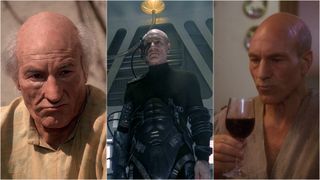Jean-Luc Picard was a revelation when he first appeared on our TV screens in Star Trek: The Next Generation. Before 1989, there was only one Star Trek captain: William Shatner's two-fisted, torn-shirted James T. Kirk. In contrast, Patrick Stewart's Picard was cultured, cerebral, bald, and French (well, sort of).
Over the course of seven seasons and four feature films, Picard went on to become perhaps the most beloved character in all of Trek. That's partly thanks to Patrick Stewart's commanding performance, but it's also down to the richness of the writing. Picard is a tough, frequently distant character; one who keeps himself at arms-length from his crew, but also one who's a keen intellect, with compassion and integrity – not to mention a hotheaded streak that puts Jim Kirk to shame. As at home driving a dune buggy and firing a phaser as he is pootling around on a vineyard, Picard's one of the most multi-faceted characters on television. For that reason, it's no surprise that he's become the first Star Trek captain to have a series named after him.
With Star Trek: Picard finally arriving on screens, we've looked gone back through the archives to find the 10 key episodes of The Next Generation that define the character. It was no easy task – what about his turn as a romantic lead in "Captain's Holiday"? Or fighting for Worf's honour in "Sins Of The Father"? – but watching these episodes will hopefully bring you up-to-speed Star Trek: Picard lands. Engage!
The Measure of A Man (S2E9, 1989)
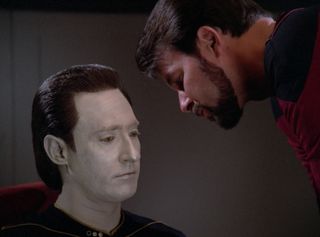
That’s right, we’re not starting with the pilot because, honestly, it’s not that good. Instead, we suggest going in on the show’s first truly great episode. "The Measure Of A Man" is a Data-centric episode, where the android's rights are called into question. Picard steps up to defend him, taking on Starfleet and even Riker who takes the position of the opposition. It may not be a big, showy episode for the Captain, but it gets to the heart of his rich relationship with Data, something that we know will be an important element in the new series.
The Best of Both Worlds – Part 1 and Part 2 (S3E26, S4E1, 1990)
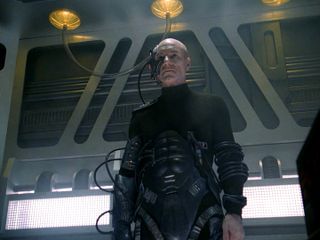
The Next Generation's third season ended with one of the all-time-great TV cliffhangers. Picard is abducted and assimilated by the Borg, forcing Riker to open fire on his old mentor. Remarkably, part two is even better, as we see the Picard-led Borg wage a devastating fight against the Federation that results in the death of (we later learn) some 11,000 Starfleet officers.
Picard is eventually rescued and restored to his full humanity, but the shadow of this physical and psychological trauma lingers over the rest of his life, leading to sometimes rash actions whenever he encounters the Borg.
Family (S4E2, 1990)

If “The Best of Both Worlds” was The Next Generation at its biggest, this is the show immediately veering off in the opposite direction. Following his nightmare with the Borg, Jean-Luc returns home to recuperate in France, but finds only strained family relations waiting for him. A focussed character piece, “Family” shows the heroic Picard in a very different light, pitting him against his brother Robert (Jeremy Kemp) who has only ambivalence and antipathy towards his glittering Starfleet career.
The Drumhead (S4E21)
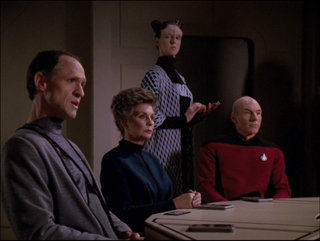
An explosion in engineering seems to be an act of sabotage, prompting Starfleet to dispatch a retired Admiral to investigate. It soon becomes clear, however, that her main interest is in pursuing a witch hunt against Picard. In the text of the show, this courtroom drama is a thrilling (and at the time rare) examination of the consequences of his past actions – particularly the carnage caused during the Borg incident. More importantly, however, it's an episode about the importance of civil rights and the impartiality of the law, giving Patrick Stewart the opportunity to deliver an impassioned speech.
Darmok (S5E2, 1991)
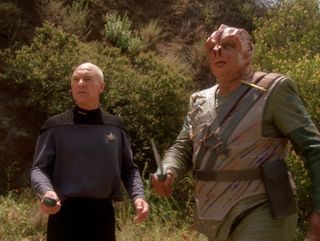
"Darmok" is an episode that demonstrates Picard's adaptability; both his grit and his fierce intelligence. When communications fail between the Enterprise and the Tamarians, Jean-Luc is forcibly transported to an alien planet where he and the alien captain Dathon must cooperate to survive. Trouble is, they can't understand each other... While the two are hunted by a deadly beast, Picard comes to realise that the Tamarians communicate entirely in metaphor and allegory, rather than direct language. His anger at being kidnapped shifts as he realises that this potentially lethal experience is Dathon's way of forging a common ground between the two. A remarkable episode that manages to make the nonsense phrase "Darmok and Jalad at Tanagra" feel both meaningful and moving.
The Inner Light (S5E25, 1992)
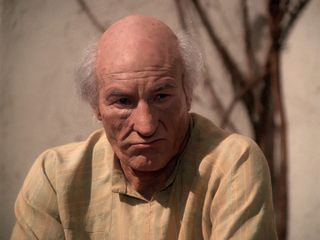
An alien probe scans the Enterprise, seemingly transporting Picard to another world and into another life. Here he is Kamin, an iron weaver with a wife and friends. His time in Starfleet, he is told, was just a delusion and this is his real life – which he proceeds to live out into old age. He's eventually "rescued" and brought back to the Enterprise with a deeply tragic explanation for what has really happened to him, but the memories of his years in this other, long-dead man’s life, linger. A classic science fiction premise and Stewart's masterful performance rightly bagged the episode the Best Dramatic Presentation award at the Hugos that year.
Chain of Command (S6E10, S6E11, 1992)

This tough two-parter features one of Star Trek's most memorable sequences. Part one finds Picard engaged in an undercover mission to destroy a Cardassion bio-weapons facility, while the no-nonsense Captain Jellico takes over the Enterprise. But when things go wrong, Jean-Luc is captured. Cue a brutal second half, which sees Picard tortured and interrogated almost to breaking point by Gul Madred (a superb performance by David Warner, rising to meet Stewart at his best) who tries to crush his indomitable spirit and sense of reality by claiming that there are five lights in the room, rather than four.
Tapestry (S6E15, 1993)
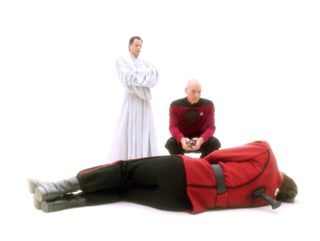
Effectively Star Trek does It's A Wonderful Life. As a rash young man, Picard found himself in an ill-advised bar brawl with some hard-ass Nausicaans. He was stabbed in the heart and, while his life was saved, his artificial heart is now breaking down. Dying, Picard encounters Q once more, who offers him a chance to do things differently. He takes it – and finds himself back on the Enterprise, now living the life of a meek junior science officer, someone who has played it safe and done very little in the process. Q episodes can be hit and miss, but this is a touching examination of the things that make Picard a great Captain.
Starship Mine (S6E18)
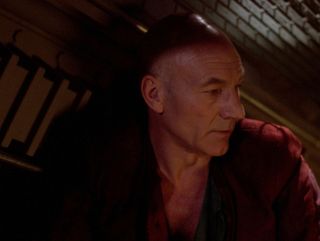
Everyone knows Picard as being a cerebral space diplomat, but he's also a cunning warrior (there's a reason the Klingons respect him so much) with a ruthless streak. In "Starship Mine" that's pushed to its limits when some crooks cause the Enterprise to be evacuated, as a way to sneak onboard and steal Trilithium resin. Alone on the ship, Picard must outwit his foes in a deadly game of cat and mouse. Yep, this is Die Hard in a Jefferies Tube, and an episode that reminds us that you should never mess with Jean-Luc Picard...
All Good Things… (S7E25, S7E26, 1994)
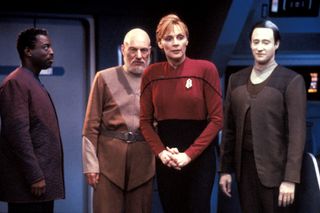
The final episode of The Next Generation brings things full-circle, returning us to Q's trial of humanity from the first episode, "Encounter At Farpoint". A spacial anomaly causes Picard to flash forwards and backwards through his own personal timeline, getting glimpses at a future where he has left Starfleet, developed the degenerative disease Irumodic Syndrome and retired to his vineyard in France. How much of that will tally with what the new show sets out remains to be seen, but the episode presents a believable portrait of Jean-Luc in old age: physically frailer, perhaps, but every bit as righteous, determined and unbeatable as ever. The finest Captain Starfleet has ever known.
Bonus watching!
These two aren’t episodes, but films – and one of them doesn’t even feature Jean-Luc...
Star Trek: Nemesis
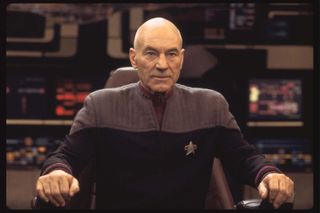
OK, cards on the table, Nemesis is not a very good film. The plot is a Wrath of Khan rehash, Tom Hardy is inexplicably awful, and there is a deeply icky “mind-rape” scene. But it’s also the character’s most recent appearance until the new series and the last big look at the Romulans, who are known to play a major part in the new series.
Star Trek (2009)
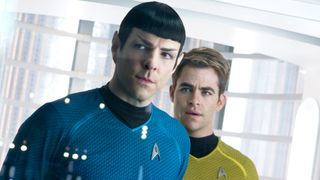
Most of J.J. Abrams' flashy reboot takes place in a divergent timeline. But its opening scenes set the stage for Star Trek: Picard, with the destruction of Romulus in The Next Generation era. Picard showrunner Alex Kurtzman has said that Picard’s departure from Starfleet was partially caused by the vast galactic changes that happened in the wake of the Romulan Empire’s dissolution, so if you have the time, try to sneak this one in.
Need more of a primer for Star Trek: Picard? Then check out our thorough breakdown of the Star Trek timeline.
